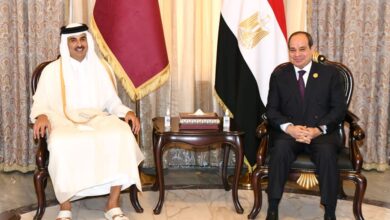"Israel appreciates the democratic process in Egypt and respects its outcome," Israeli Prime Minister Benjamin Netanyahu said on Sunday following the announcement that Muslim Brotherhood candidate Mohamed Morsy won Egypt’s presidential elections. "Israel expects continued cooperation with the Egyptian administration on the basis of the peace accord between the two countries, which is in the interest of the two peoples and contributes to regional stability.”
Netanyahu’s measured response belies widespread confusion within Israeli media outlets as they strive to come to grips with what Morsy’s victory means for Israel. Reactions in the Israeli press to Morsy’s victory range widely — from hysterical predictions of regional war to cautious optimism that a Brotherhood-controlled government could actually work in Israel’s favor.
“The Islamist victory in Egypt, and the changes that are yet to come, will likely usher in an era of military conflict, financial ruin, and social calamity on a grander scale than previously witnessed in our turbulent region,” writes journalist Yigal Walt for Yediot Aharonot, Israel’s most widely circulated daily. “Even more tragically, the dreadful ramifications of this ill-advised adventure will be felt not only in the Middle East, but across the whole world.”
In the right-leaning Israel Hayom, prominent Israeli journalist Boaz Bismuth writes that with Morsy’s election, “the West’s worst fears [of Islamists coming to power] until two years ago turned into — in the name of democracy — a done deal.” He opens his article by claiming that Hassan al-Banna, who founded the Muslim Brotherhood in 1928, finally achieved his goal — after an 84-year wait — to take over Egypt. After suggesting that the Brotherhood seeks to unite the Arab world under Banna’s vision of “a singular international Islamic regime,” he blames US President Barack Obama for “breaching” a metaphorical “Aswan dam” — probably a reference to Mubarak’s authoritarian regime — and allowing Islamists to take over.
Bismuth is one of many Israeli commentators who begrudged the US president when abandoning Mubarak February last year in the face of popular unrest.
Writing for the same paper, journalist Dan Margalit fears that escalating tensions with Israel could become a way for the Brotherhood to distract from domestic concerns. “When faced with bridging his country's more immediate diplomatic and financial interests and the potential disappointment of different sectors of the population, Morsy might find himself conceding to populist demands,” he writes. “The common modus operandi of leaders in the Middle East in these kinds of situations is to incite against Israel. If it wasn't for that, Iran wouldn’t have immersed itself in such a meaningless crusade against the Jewish state. Morsy might take a similar decision.”
The fact that Morsy will not have the power to unilaterally declare war causes one commentator to question Morsy’s true intentions. “On a larger scale, no one in the defense establishment is really talking about the possibility of a war with Egypt,” writes Yaakov Katz, a defense analyst for the conservative Jerusalem Post. “But the Egyptian military council’s decision last week to deprive the president of some of his rights, notably the right to go to war, raised an eyebrow or two at the Defense Ministry … Could it be that the Egyptian generals know something about the Muslim Brotherhood that Israel doesn’t?”
However, even Katz concludes that Morsy’s limited powers as president, with real control of the country’s affairs lying safely in the hands of Egypt’s ruling military council bodes well for Israeli-Egypt relations. The council will continue to hold onto its powers in defense and foreign policy and Morsy will only be able to declare war without the council’s full consent. Even better for Israel, Katz believes, Egypt’s continuing economic troubles will force Morsy to concentrate on domestic issues.
“What consoles Israel for now is that Mohamed Morsy — Egypt’s president elect — will have far greater challenges to deal with than to pick a fight with the Jewish state,” says Katz, who believes that Egypt will remain dependent international economic assistance, which “will serve as some leverage in ensuring that Egypt retains normalized ties.”
Eyal Zisser, a Middle East history professor at Tel Aviv University, agrees. “Morsy has 86 million Egyptians to feed,” he says, during an interview with Channel 2 News, Israel’s most widely watched news network. “So the Israeli issue is not going to be a major concern.”
Some commentators, such as Udi Segal for Channel 2 News, acknowledge Morsy’s election as a double-edged sword, one that could strengthen Israel’s security by helping legitimize peace with Israel among conservative Muslims. “It may be hard to swallow, but the fact an Egyptian president upholds the peace agreement with Israel for strategic reasons, not as a favor to Israelis, condones the [peace] process in the eyes of devout Muslims throughout the world,” he writes.
Whereas many see Hamas as a major beneficiary of Morsy’s election, Segal sees the possibility that the Brotherhood could keep the border calm by seeking to reign in its junior offshoot.
“Furthermore, Morsy’s connection to Hamas: From one side, a problem — Israel can’t launch campaigns like ‘Operation Cast Lead’ [in reference to fighting against Gaza in 2009] without thinking twice. On the other hand, the Brotherhood’s influence over them and its interest in maintaining peace both in Gaza and in Sinai” could push Egypt to deal with the problem more decisively than it did under Mubarak.
In Israel, “we need … to be worried that Egypt is turning into a democratic and free country,” journalist Jacky Chouri writes sardonically in the left-leaning Haaretz. Chouri says Israel needs to adapt to the new political reality by changing its behavior.
“In this case, it won’t be possible to make a deal with one all powerful figure like Mubarak … or send emissaries to Cairo when they protest an Israeli military operation in Gaza, the West Bank, or Lebanon. With a democratic Egypt, Israelis will have to confront a nation that sets its own agenda, and Israel would do itself a favor now if it proved that it was striving for a regional settlement, especially with the Palestinians, rather than simply building a fence on the Egyptian border.”
But according to other commentators, Israel is doing more than building a fence: It has already begun to train troops and devise scenarios for war on its Egyptian border.
“Since Mubarak’s downfall, Israel has been quietly preparing for a possible conflict with Egypt,” writes Katz. “Not one that will happen tomorrow or even next year but sometime in the coming decade.”




